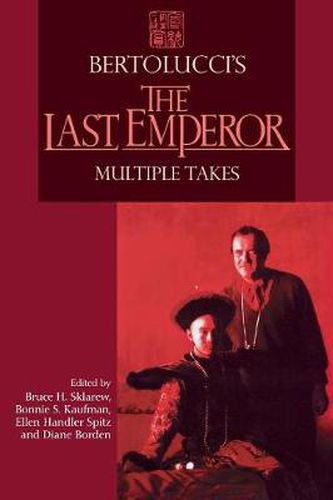Readings Newsletter
Become a Readings Member to make your shopping experience even easier.
Sign in or sign up for free!
You’re not far away from qualifying for FREE standard shipping within Australia
You’ve qualified for FREE standard shipping within Australia
The cart is loading…






This title is printed to order. This book may have been self-published. If so, we cannot guarantee the quality of the content. In the main most books will have gone through the editing process however some may not. We therefore suggest that you be aware of this before ordering this book. If in doubt check either the author or publisher’s details as we are unable to accept any returns unless they are faulty. Please contact us if you have any questions.
In this anthology, filmmakers, psychoanalysts, film scholars and cultural historians use a psychoanalytic approach to examine Bernardo Bertolucci’s epic film
The Last Emperor
(1988). Evolving out of a conference on Bertolucci’s work, the essays interweave psychological, political and cinematic themes in
The Last Emperor
as well as in much of Bertolucci’s other works. This volume includes a foreword by Bernardo Bertolucci and is organized into four parts or
takes , including
Filmcraft ,
Psychoanalysis ,
Film Scholarship
and
Cultural History . The collection begins with the filmmaker’s perspective. In
Take One , an interview with Bertolucci discusses the potential of psychoanalysis to transgress social order which Bertolucci explores in
The Last Emperor ; cinematographer Vittorio Storaro’s essay on the photographic conception of
The Last Emperor
offers a glimpse of the creative impulse at work; and a chapter from Fabien S. Gerard’s shooting diary records the excitement and tedium on the set of
The Last Emperor . Analyzing the character and psychopathology of Aisingioro Pu Yi as Bertolucci represented him, clinicians Bruce H. Sklarew, Estelle Shane and Morton Shane explore the relationship between psychoanalytic theory and art criticism in
Take Two . Diane Borden and Bonnie S. Kaufman look at the use of psychoanalysis and the formal aspects of filmmaking, such as images, camera shots and framing in
The Last Emperor . In
Take Three , Farimah Tobing Rony investigates Bertolucci’s representation of Eastern culture from what she argues is a Europhallocentric position; T. Jefferson Kline gives an overview of Marxist, psychoanalytic and cinematic issues intersecting in the film; and Lynda K. Bundtzen looks at the theme of castration and its resonance with
auteur
theory. In
Take Four , the late sinologist John K. Fairbank and academic art historian Ding Ning look at historical versus artistic representations of history in
The Last Emperor , while Robert Burgoyne, Robert Zaller and Ellen Handler Spitz look at contrasting historical processes. Although we can never fully know the real Aisingioro Pu Yi, Bertolucci used his vision of the intricate relationship between art, ideology and the psychic experience to tell the story of one ordinary man’s extraordinary life.
Bertolucci’s ‘The Last Emperor’
hopes to illuminate this complex and often enigmatic creation as well as renew an excitement about the possibilities of interdisciplinary criticism in film studies.
$9.00 standard shipping within Australia
FREE standard shipping within Australia for orders over $100.00
Express & International shipping calculated at checkout
This title is printed to order. This book may have been self-published. If so, we cannot guarantee the quality of the content. In the main most books will have gone through the editing process however some may not. We therefore suggest that you be aware of this before ordering this book. If in doubt check either the author or publisher’s details as we are unable to accept any returns unless they are faulty. Please contact us if you have any questions.
In this anthology, filmmakers, psychoanalysts, film scholars and cultural historians use a psychoanalytic approach to examine Bernardo Bertolucci’s epic film
The Last Emperor
(1988). Evolving out of a conference on Bertolucci’s work, the essays interweave psychological, political and cinematic themes in
The Last Emperor
as well as in much of Bertolucci’s other works. This volume includes a foreword by Bernardo Bertolucci and is organized into four parts or
takes , including
Filmcraft ,
Psychoanalysis ,
Film Scholarship
and
Cultural History . The collection begins with the filmmaker’s perspective. In
Take One , an interview with Bertolucci discusses the potential of psychoanalysis to transgress social order which Bertolucci explores in
The Last Emperor ; cinematographer Vittorio Storaro’s essay on the photographic conception of
The Last Emperor
offers a glimpse of the creative impulse at work; and a chapter from Fabien S. Gerard’s shooting diary records the excitement and tedium on the set of
The Last Emperor . Analyzing the character and psychopathology of Aisingioro Pu Yi as Bertolucci represented him, clinicians Bruce H. Sklarew, Estelle Shane and Morton Shane explore the relationship between psychoanalytic theory and art criticism in
Take Two . Diane Borden and Bonnie S. Kaufman look at the use of psychoanalysis and the formal aspects of filmmaking, such as images, camera shots and framing in
The Last Emperor . In
Take Three , Farimah Tobing Rony investigates Bertolucci’s representation of Eastern culture from what she argues is a Europhallocentric position; T. Jefferson Kline gives an overview of Marxist, psychoanalytic and cinematic issues intersecting in the film; and Lynda K. Bundtzen looks at the theme of castration and its resonance with
auteur
theory. In
Take Four , the late sinologist John K. Fairbank and academic art historian Ding Ning look at historical versus artistic representations of history in
The Last Emperor , while Robert Burgoyne, Robert Zaller and Ellen Handler Spitz look at contrasting historical processes. Although we can never fully know the real Aisingioro Pu Yi, Bertolucci used his vision of the intricate relationship between art, ideology and the psychic experience to tell the story of one ordinary man’s extraordinary life.
Bertolucci’s ‘The Last Emperor’
hopes to illuminate this complex and often enigmatic creation as well as renew an excitement about the possibilities of interdisciplinary criticism in film studies.